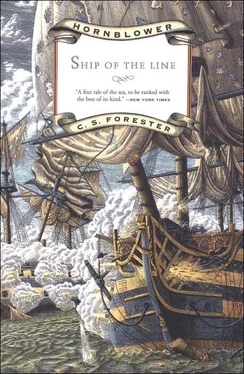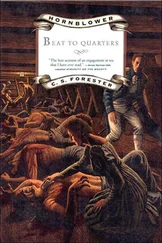The light was broadening fast. Eastwards the watery clouds seemed to be thinning; just above the horizon. Undoubtedly they were thinning; for a second they parted, and a speck of gold could be seen through them, just where the white-flecked sea met the sky, and a long beam of sunlight shone level over the sea.
“Land-ho!” yelled the masthead lookout, and westward they could see a bluish smudge on the horizon where the mountains of Spain loomed faintly over the curve of the world.
And Gerard glanced anxiously at his captain, took a turn or two up and down the deck, gnawed at his knuckles, and then could restrain his impatience no longer.
“Masthead, there! What do you see of the enemy?”
The pause that followed seemed ages long before the reply came.
“Northin’, sir. Northin’ in sight barrin’ the land to looard.”
Gerard renewed his anxious glance at his captain, but Hornblower, during that pause, had set his face sternly so that his expression was unmoved. Bush was coming on to the quarterdeck now; anyone could see that he was wild with anxiety. If four French ships of the line had evaded action it would mean half pay for Hornblower for life, if nothing worse. Hornblower retained his stony expression; he was proud of being able to do so.
“Put the ship about, Mr. Gerard, if you please, and lay her on the starboard tack.”
The French might perhaps have altered course in the darkness, and might now be lost in the centre of the Western Mediterranean, but Hornblower still did not think it likely. His officers had made insufficient allowance for the lubberliness of the unpractised French. If Gerard had had to reef topsails in the night they might well have had to heave to; and both Bush and Gerard were over-eager—during the night the Sutherland might have gained twenty miles on the French. By retracting his course he was confident that he would sight them again.
Confident as far as the whist-playing part of his mind was concerned, that is to say. He could not control the sick despair in his breast, nor the acceleration of his heart beats; he could only conceal them, keeping his face a mask and forcing himself to stand still instead of pacing about in his anxiety. Then he thought of an activity which would help to occupy his mind and yet not betray his nervousness.
“Pass the word for my steward,” he said.
His hands were just steady enough to permit him to shave, and a chill bath under the washdeck pump gave him new vigour. He put on clean clothes and parted his lessening hair with elaborate exactitude, for under the washdeck pump he had told himself that they would sight the French again before he had completed his toilet. It was with a sense of acute disappointment that he laid down the comb when he had no more smallest excuse to continue its use, and turned to put on his coat, with no news of the French. And then, with his foot on the companion, there came a wild yell from Midshipman Parker at the masthead.
“Sail in sight! Two—three of ‘em, sir. Four! It’s the enemy!”
Hornblower continued his progress up the companion without faltering in his step, and he hoped people noticed it. Bush was half way up the rigging with his glass, and Gerard was pacing—almost prancing—about the quarterdeck in his delight. Observing them, Hornblower was glad he had had no childish doubts about the correctness of his actions.
“Wear the ship, if you please, Mr. Bush. Lay her on the port tack.”
A talkative captain might supplement the order with a brief explanation of the necessity for keeping the ship between the French and Spain, but Hornblower bit off the explanation as it rose to his lips. No unnecessary words would escape him.
“The wind’s still working round southerly, sir,” said Gerard.
“Yes,” said Hornblower.
And it would drop a good deal, too, as the day progressed, he decided. The sun was fast breaking through the clouds, with every prospect of a warm day—a Mediterranean autumn day, with a rising barometer and only the faintest of breezes. The hammocks had been piled in the netting, and the watch not at their stations were clattering on to the deck with buckets and holystones. The routine of the navy had to be maintained, even though there was every chance that the decks they were swabbing would be running with blood before the day was over. The men were skylarking and joking—Hornblower felt a little thrill of pride as he looked at them and remembered the sullen despondent crowd with which he had sailed. Consciousness of real achievement was some compensation for the thankless service which employed him; and it helped him to forget, too, the uneasy feeling that today or tomorrow—soon, anyway—he would know again, as the whirl of battle eddied round him, the physical fear of which he was so intolerably ashamed.
As the sun climbed up the sky the wind dropped steadily, moving round even more southerly, and the mountains of Spain came nearer and nearer and grew more and more defined as their course brought them closer to the land. Hornblower held on as long as he could, bracing up his yards as the wind veered, and then finally heaving to while the French squadron crept up over the horizon. The shift in the wind had deprived them of the windward position; if they moved down to attack him he could escape northwards so that if they pursued him they would be running towards the Pluto and Caligula, but he had no hope that they would. French ships of the line who had evaded the blockading squadron would race to accomplish their mission first, and would only fight afterwards, however tempting the bait dangled before them. If the wind shifted no farther round they could just hold their course for Barcelona, and he had not the least doubt that they would do so if not prevented. He would hang on to them and try to attack some isolated ship during the night if no help arrived.
“They’re signalling a lot, sir,” said Bush, his glass to his eye. They had been signalling all day, for that matter—the first flurry of bunting, Hornblower shrewdly surmised, had been occasioned by their catching sight of the Sutherland, unaware that she had been keeping company with them for fifteen hours. Frenchmen retained their talkative habits at sea, and no French captain was happy without messages passing back and forth along the squadron.
The Sutherland was clear of the Cape Creux peninsula now, and Rosas Bay was opening out on her beam. It was in these very waters, but in very different weather conditions, that the Pluto had lost her masts and had been towed to safety by the Sutherland ; over there, on those green-grey slopes, had occurred the fiasco of the attack on Rosas; through his glass Hornblower thought he could discern the precipitous face of the mesa up which Colonel Claros had led his fugitive Catalans. If the wind came farther round now, the French had a refuge open to them under the guns of Rosas, where they would be safe until the British could bring up fireships and explosion vessels to drive them out again; actually it would be a more secure refuge for them than the anchorage at Barcelona.
He looked up at the pendant flapping at the masthead—the wind was certainly more southerly. It was growing doubtful whether the French would weather Palamos Point on their present tack, while he would certainly have to go about soon and stand out into the Frenchmen’s wake, with all his advantages of position lost by the inconstancy of the weather. And the wind was beginning to come in irregular puffs now—a sure sign of its diminishing force. He turned his glass on the French squadron again to see how they were behaving. There was a fresh series of signals fluttering at their yardarms.
“Deck, there!” yelled Savage from the masthead.
Читать дальше









